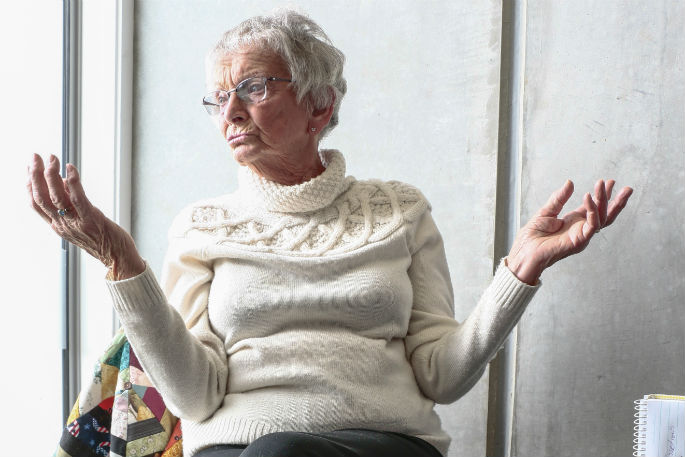'I was kid running and someone said: ‘Look at that little Puck go'.”
And that was the day Johanna Cornelia van der Beek, a rich and exotic moniker, became just Puck. Puck van der Beek.
'Puck is what everyone knows me as so don't worry about the other name.” Apologies Puck, but to appreciate Puck you have to know the other bit, which is Johanna Cornelia.
It could also just as easily hark back to Puck from the Bard's ‘A Midsummer Night's Dream' –that clever, mischievous elf, sprite or jester that personifies the wise knave. Because this 90-year-old fireball is delightfully all of those things.
And that's why she is treasured at Papamoa Patchers – a club of quilters. 'Papamoa Patchers, now that is a good name. A no nonsense name,” says a no nonsense Puck.
That's a privilege of this job – assigned to scribe a few lines about an upcoming event – the Papamoa Patchers' Quilt Show 2016 at Mount Maunganui College from September 30-October 2. Entry is a gold coin donation.
Then tucked away under a corner of one of those quilts is pure gold – a seam of gold in this case – a larger than life personality like Puck.
It's not so much that Puck is a patcher – it's why and when. She was 80 years old and looking for a hobby when she joined Papamoa Patchers. But 80-year-olds use quilts, they don't make them.
She saw a newspaper advertisement for a club. 'As long as it wasn't a ‘knit one, purl one' club. I love knitting but I already know enough about knitting.
'Don't need to join a knitting club.”
And besides, she's knitting husband Henk a jumper at the moment. 'He's turning 91 soon, so I have to be quick so he can wear it.” This Puck is pure mischief.
They say idle hands make fretful minds. Well not Puck.
She's made furniture – cabinets for her girls and a sawhorse for Henk's Christmas present. Her woodwork teacher told her she did a fantastic job.
She's done metal work – made eight chairs for the family's big dining table. She went to The School of Fine Art in Auckland and learned pottery from the late Barry Brickell – one of the country's most celebrated ceramic artists.
'I have lived a long time and I know a lot of things. I have actually done a helluva lot.”
Puck went to leather classes. 'I learned to make beautiful bags, I say beautiful and they were beautiful.” And belts, which were hung in husband Henk's menswear shop in Putaruru. 'They sold better than the ones from the manufacturer.
'I also knitted Henk a jacket, which he wore to the shop one day.” It was style popular in Putaruru. 'And when Henk asked a customer what he wanted, he pointed to Henk's jacket.” Henk sold it to him on the spot. A quick $80 thank you. A sale is a sale.
So from the old country to Putaruru. What's the connection with Putaruru? Puck and Henk joined the exodus out of the 'lower countries” in the 1950s. 'We had family farming around Putaruru but Henk hated cows.”
Puck has never painted, never put brush to canvas even though she wished she had. 'However, I did paint the family home.” As she raised a family and dabbled in all her other hobbies. As they say idle hands make for fretful minds. Oh yes – and she cooked, of course. 'Always – my family never had fish and chips.”
There's the thick Dutch accent, even after 60 years of dilution. And some of the information is lost in the telling or the listening.
I lower the voice and ask respectfully: 'When did you lose Henk?”
'What do you mean lose?” Puck asks. The reporter is walking a tightrope. It's getting decidedly uncomfortable. I explain 'lose” as in passing, deceased, dead.
'Henk's around the corner,” she explains. Does she mean Henk's plot is around the corner? Is it a euphemism for ‘departed'? 'No!” Henk's around the corner at home. Henk is very much alive. Un-deceased.
Puck falls about laughing. 'Great joke,” she says and she can't wait to get home to tell Henk about his good fortune, his lucky brush with the afterlife.
And she admits to speaking something called ‘double Dutch' – she will say something but be unaware of which language she has used. And she also talks of a sympathetic accent, which her children reserve especially for conversation with their parents.
But this is a story about a bunch of women who enjoy quilting.
'They're fantastic,” says Puck. 'Nothing bad is said, no criticism, no gossip.” And everyone is very happy to share their knowledge.
'I love the whole lot of them,” says Papamoa patcher Puck. 'And I think they love me too. Isn't that nice?”
We know they do for certain Puck. And yes, it is nice.

